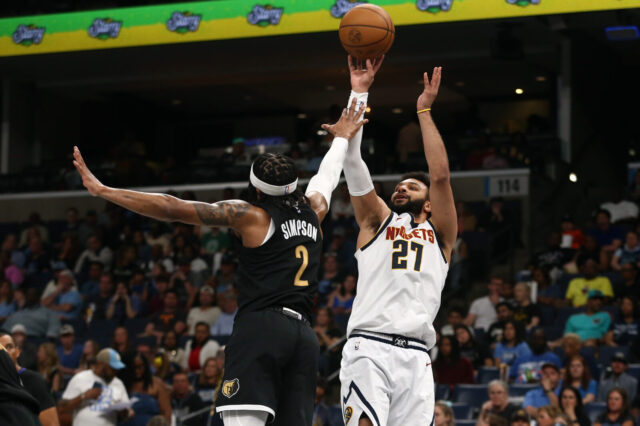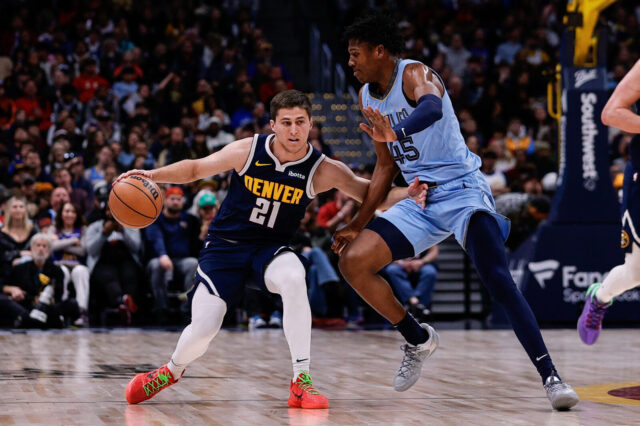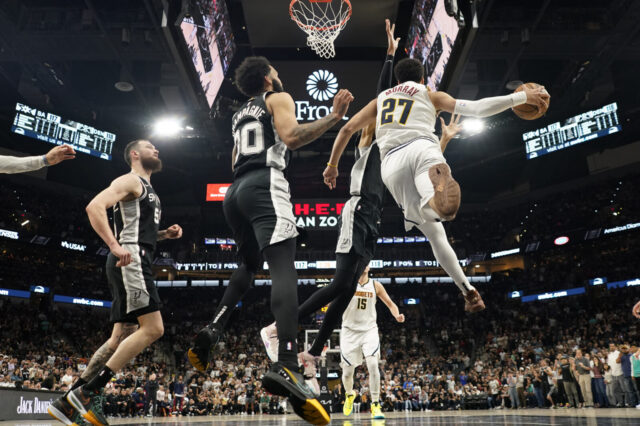The Denver Nuggets were spiraling.
In head coach Michael Malone’s second season, the franchise that tethered its hopes to 19-year-old Emmanuel Mudiay had struggled to begin the season. Trying to make things work with the raw and inexperienced point guard was difficult, and those issues were compounded by experimentation with an abnormally large starting lineup featuring Nikola Jokic and Jusuf Nurkic together. Both bigs were talented, yet inexperienced. That lack of veteran poise was showing. After a 3-5 start that felt a lot worse than it sounds in hindsight, Jokic volunteered to come off the bench for the betterment of the team. Malone obliged, leaving Nurkic as the focal point at center.
Things did not improve. With Nurkic as the starter for the next 17 games, the Nuggets went 6-11. The Bosnian center averaged the most turnovers per game during that stretch, and Jokic played more minutes than him in a bench role simply because the team was better with Jokic on the floor. On December 12th, 2016, the Nuggets were trounced on the road by the Dallas Mavericks. Only two players performed well for Denver that night – Jokic and Murray. Little did fans know that this game was the tipping point for the next several years of Nuggets basketball.
The Fateful Day
On December 15th, 2016, Michael Malone made the fateful decision to start Nikola Jokic and bench Jusuf Nurkic against…the Portland Trail Blazers. The team immediately reaped the benefits. Jokic had what is now considered a pedestrian stat line of just 13 points, four rebounds, and five assists in just 19 minutes, but the way the team played around him personified everything Denver wanted in an offense. They scored 132 points by spacing the floor, cutting backdoor, letting Jokic facilitate from the top of the key, and running hard in transition.
In addition, it gave Nuggets fans what may still be Nikola Jokic’s best highlight of his career.
Danilo Gallinari had 27 points that night, and when asked about how the new starting lineup impacted his ability to score, he spoke highly of the spacing and passing ability of all players on the floor.
“My teammates were finding me open at the right time,” Gallinari said. “Everybody, especially Jokic, is a great passer. So they can find you at any moment.”
The Blazers had no answer for Jokic facilitating and scoring on the short roll to the rim. With his basketball acumen and spatial awareness, Jokic picked apart Mason Plumlee, Noah Vonleh, and the rest of the Blazers front court by putting himself and his teammates in the best position to score. It was truly the beginning of Jokic-ball.
The rest of the 2016-17 season
From that moment on, Denver’s year completely changed, finishing the year by going 31-24 and narrowly missing the playoffs. More importantly though, the team had discovered their identity by taking a significant leap of faith. At the time, Jokic was a 21-year-old second round pick from overseas with decisive weaknesses to his game. He wasn’t an anchor on defense, but what he did provide was an outlet for excellent offense for the rest of the season.
This content is no longer available.
With Jokic as the starter for the rest of the season, the Nuggets dominated on the offensive end, so much so that they posted the best Offensive Rating in the NBA by far. Ahead of the Golden State Warriors. Ahead of the Houston Rockets. For a team that struggled to do anything well for awhile, the Nuggets finally found something they were good at: moving without the basketball. Jokic was at the center of it, throwing highlight passes, scoring with high efficiency, and making the team better. Among qualified starters, Jokic’s 118.2 Offensive Rating after December 15th was the third best in the NBA behind Stephen Curry and Kevin Durant.
Jokic himself went on to have one of the most unique seasons of all time, averaging 16.7 points, 9.8 rebounds, and 4.9 assists on 64.0% True Shooting. The only big man in NBA history to ever match or exceed those averages was Charles Barkley, according to Basketball Reference. His synergy with teammates, most notably Gary Harris, helped Denver immensely throughout the year, as Jokic could rely on others to share the scoring burden as long as they directed the ball through him.
Jokic wasn’t perfect. He struggled to assert himself in crucial moments and his defense left a lot to be desired. Despite that, Denver had clearly found their cornerstone of the future. While first round pick Emmanuel Mudiay was initially deemed the savior of the franchise, second round pick Nikola Jokic nonchalantly saved it in the only way he knew how: being himself.
For a franchise defined by the phrase NuggLife, a singular representation of how unlucky things can get, the Nuggets finally lucked out. But that luck required opportunity, and an opportunity that could only be given if the head coach was willing to take a leap of faith. Michael Malone was under no obligation to commit to the young Serbian, and frankly, it could have been justified if he didn’t. Denver believed in Jusuf Nurkic as a potential cornerstone, and he had shown enough flashes to justify sticking with the Bosnian center for the purpose of development.
“While first round pick Emmanuel Mudiay was initially deemed the savior of the franchise, second round pick Nikola Jokic nonchalantly saved it in the only way he knew how: being himself.”
In addition, hindsight depicts how Nurkic reacted to the benching once it happened, something that Malone and his coaching staff may have foreseen. Still, they did it anyway. If things did not work with Jokic, Denver’s chemistry with that cast of characters may have gone up in flames much like other rebuilding organizations at various points in their march to relevancy. If that happens, coaches are usually fired. As it happens, the team responded well to Jokic in the starting lineup, but that doesn’t make it any less gutsy.
Fallout from a gutsy move
In the years to come, the Nuggets transitioned to become Jokic’s team. Scoring forward Danilo Gallinari was replaced by a two-way veteran in Paul Millsap. Scoring guard Jamal Murray replaced Mudiay and Jameer Nelson in the starting lineup, effectively forcing Jokic to adopt more playmaking responsibility. Since then, the Nuggets have gone full Jokic-ball, using sets that revolve around Jokic’s ability to see the entire floor, make the right read, and sometimes pass to teammates before they even know they’re open. In doing so, the Serbian center is averaging 7.6 assists per game, more than any center since Wilt Chamberlain, who averaged over 45 minutes per game during those high volume assist seasons.
More importantly though, the Nuggets are really good. Their learning experiences over the last two years have taught them about the necessity of defending at a high level, leading to an 18-9 record, Denver’s best start to the season since 2009-10. Even with the injuries piling up, the Nuggets remain really good because of their identity: run the ball through Jokic on offense and defend as well as you can.
In the end, none of this happens without the fateful events of December 15th, 2016. Jokic probably doesn’t turn into a player worthy of a max contract. Nurkic, Gallinari, and even Kenneth Faried might still be on the team. Michael Malone may have lost his job that year had he not done something drastic.
Nuggets fans – as we close out Jokic Week, take solace in looking back on the events of two years ago. The Nuggets were in trouble. They had just sustained one of their most demoralizing losses of the Michael Malone coaching era. Morale was at an all-time low, and there was very little to be hopeful for after an awful start to the year.
It may sound hyperbolic to call Jokic a franchise savior, but the two-year turnaround from that point to Denver’s current position (first place in the Western Conference, an abundance of young talent, and injury reinforcements on the way) clearly warrants it. None of this is possible without the Nuggets lucking into one of the best players drafted in the second round of all-time.
The Jokic era began two years ago, and it’s been so much fun every step of the way.


